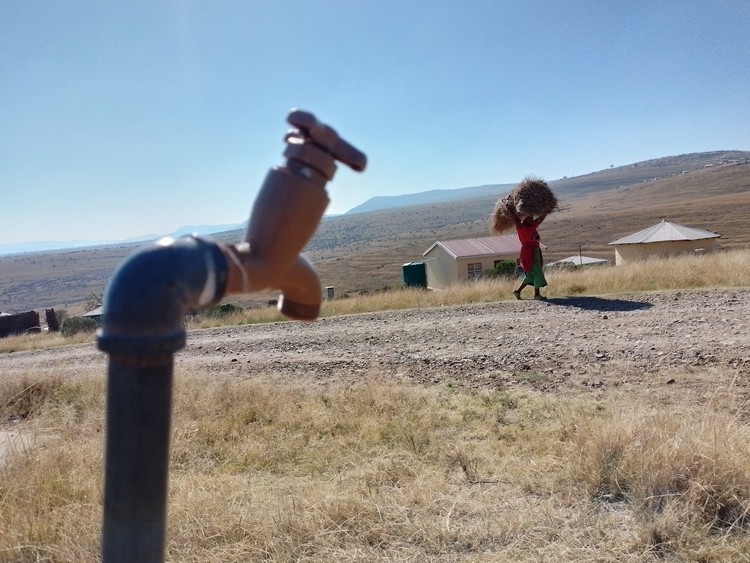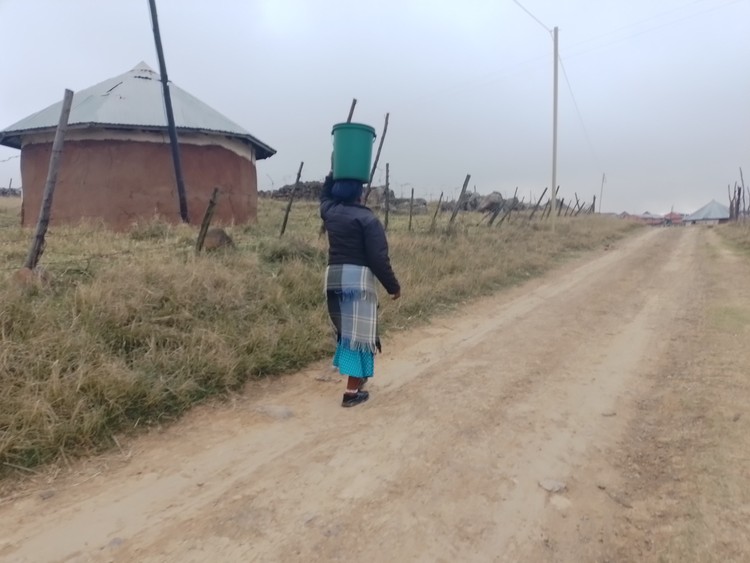These villagers got taps five years ago … but have never had water
Villages around Cofimvaba in the Eastern Cape battle for water
A woman passes a tap that has not had running water for over five years in Sabalele village near Cofimvaba. Photos: Sandiso Phaliso
- Villagers in the Cofimvaba area in the Eastern Cape say water has never flowed from the taps which were installed in their villages five years ago.
- They say they have to buy water from owners of bakkies and donkeys who go to fetch it from rivers.
- Those who cannot afford to buy have to go to the rivers themselves.
- The district municipality says illegal connections, theft and vandalism has destroyed water infrastructure.
Taps were installed in villages around Cofimvaba in the Eastern Cape five years ago. But no water has ever flowed from the taps, say villagers.
Villagers in Cofimvaba’s Sabalele, Mncuncuzo, Ilinge, Ncorha, Lubisi, Ntshingeni, Qamata and St Marks say the taps do not function. Residents have to buy water, for up to R20 for five litres. Those who cannot afford to do so must walk long distances, sometimes up to 10km, to fetch the water from the rivers and streams.
Water for a traditional ceremony such as a funeral can cost up to R3,000.
For owners of bakkies and trucks, the sale of water has become a business.
Nomazotsho Kwinana from Sabalele in Cofimvaba walks five kilometers to fetch her water from a water tank in an abandoned house. When the tank dries up, she relies on a spring, walking up and down a steep hill several times a day.
Other villagers pay R30 for a vehicle to take them to and from the river, but she does not have the money, she says.
“Taps were installed more than five years ago but there has been not a single drop of water all these years.”
“We feel undermined and neglected,” said Kwinana.
Kwinana said some people have taken advantage of the scarcity of water and created a business by selling water that they collect from the river by cars, donkeys, trolleys or on foot.
“Every day people flock to the river because their taps are dry and their Jojo tanks are empty because it has not rained for several months,” added Kwinana.
“If you don’t have a water tanker you are not going to have water to drink, cook and do your laundry unless you have money to buy it, and it is expensive, especially for the unemployed,” says Andile Dotwana from Ntshingeni in Cofimvaba. “We don’t bath everyday because water now has become a commodity. Every drop counts.”
“Pensioners use their last cent to buy water that should be allocated for free. This government is failing us,” said Dotwana.
“Many young men in this village have taken the responsibility to sell water to older people in return for payment. What is important in this government is that we must vote.”
Ntombizanele Mcekelo walks about 10km to get water from a stream because the taps have no running water in Mncuncuzo village.
A bakkie owner in Cofimvaba, who asked to remain anonymous for fear of intimidation, told GroundUp that he sells water he fetches from the rivers to more than 20 villages in Cofimvaba. “No one is forced to buy. I have guys that help me collect the water from the rivers and I pay them, that means I am creating temporary employment for these guys. I saw an opportunity and I used it. There is nothing wrong with that.”
He said some customers paid in instalments. “To the people buying the water I am helpful, and they appreciate the service because they can’t afford to travel to these rivers and dams,” he said.
Chris Hani District Municipality spokesperson Thobeka Mqamelo blamed the lack of water on “illegal water connections, theft and vandalism of infrastructure” which strained the water supply. She said the municipality “has had to replace stolen tap heads on numerous occasions, theft of generators, vandalism to pump houses”.
Mqamelo said the municipality was in the process of replacing an old asbestos pipeline between Tsojana and Cofimvaba.
In the Tsomo area, rural villages were in the process of being connected to the recently completed Tsomo Water Treatment Works, according to Mqamelo.
The district municipality has 19 water trucks to provide water to villages, but the area is too big to service effectively, she said.
“To counter this, the district municipality has embarked on a programme to identify and protect springs in rural areas where this is viable. This programme will definitely bring relief in water-stressed rural areas. The municipality is hard at work fast-tracking measures to improve water supply across the district,” said Mqamelo.
Support independent journalism
Donate using Payfast

Next: New proposal puts Kruger National Park’s environmental safeguards “at risk”
Previous: Conditions in Greyton settlement worsen as land restitution process drags on
© 2024 GroundUp. This article is licensed under a Creative Commons Attribution-NoDerivatives 4.0 International License.
You may republish this article, so long as you credit the authors and GroundUp, and do not change the text. Please include a link back to the original article.
We put an invisible pixel in the article so that we can count traffic to republishers. All analytics tools are solely on our servers. We do not give our logs to any third party. Logs are deleted after two weeks. We do not use any IP address identifying information except to count regional traffic. We are solely interested in counting hits, not tracking users. If you republish, please do not delete the invisible pixel.


